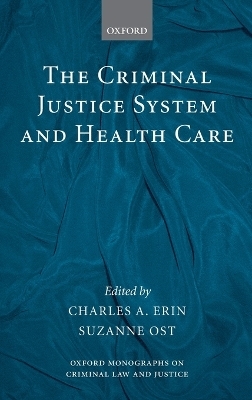
The Criminal Justice System and Health Care
Oxford University Press (Verlag)
978-0-19-922829-4 (ISBN)
This book examines questions of medical accountability and ethics. It analyses how the criminal justice system regulates health care practice, and to what extent it can and should be used as a tool to resolve ethical conflict in health care.
For most of the twentieth century, criminal courts were engaged in matters relating to medicine principally as a forum to resolve ethical controversies over the sanctity of life. However, the judiciary approached this function with reluctance and a marked tendency to defer to the medical profession to define what constituted ethical, and thus lawful, conduct. However, over the past 25 years, criminal courts have increasingly been drawn into these types of question, and the criminal law has become a major actor in the resolution of ethical conflict.
The trend to prosecute for aberrant professional conduct or medical malpractice and the role of the criminal process in medicine has been analytically neglected in the UK. There is scant literature addressing the appropriate boundaries of the criminal process in resolving ethical conflict, the theoretical legal analysis of the law's relationship with health care, or the practical impact of the criminal justice system on professionals and the delivery of health care in the UK. This volume addresses these issues via a combination of theoretical analyses and key case studies, drawing on the experiences of other carefully selected jurisdictions. It places a particular emphasis on the appropriateness of the involvement of the criminal justice system in health care, the limitations of this developing trend, and solutions to the problems it throws up. The book takes euthanasia as a primary example of the issues raised by the intersection of health care and the criminal law, and questions whether health care issues appropriately fall within the remit of the criminal justice system.
Charles A. Erin is a Senior Lecturer in Applied Philosophy, School of Law, University of Manchester Suzanne Ost is a Lecturer in Law, School of Law, University of Manchester
Foreword ; Introduction ; 1. Criminalising Medical Malpractice ; 2. Medical Manslaughter: The Rise (and Replacement) of a Contested Crime? ; 3. Medical or Managerial Manslaughter? ; 4. When Are Errors a Crime? - Lessons from New Zealand ; 5. Euthanasia and the Defence of Necessity: Advocating a More Appropriate Legal Response ; 6. Criminal Law is the Problem, Not the Solution ; 7. Lessons in Legal and Judicial Ethics from Schiavo: The Special Responsibilities of Lawyers and Judges in Cases Involving Persons with Severe Cognitive Disabilities ; 8. Assisted Dying Legislation: Ethical Dilemmas for Doctors ; 9. Terminating Life and Human Rights: The Foetus and the Neonate ; 10. Dignity: The Difference between Abortion and Neonaticide for the Severely Disabled ; 11. Omission of Medical Treatment for Severely Disabled Newborns and Criminal Liability Under Spanish Law ; 12. Should We Criminalize HIV Transmission? ; 13. The Rightful Domain of the Criminal Law ; 14. Medicalising Crime? Criminalising Health?
| Erscheint lt. Verlag | 29.11.2007 |
|---|---|
| Reihe/Serie | Oxford Monographs on Criminal Law and Justice |
| Zusatzinfo | tables and figures |
| Verlagsort | Oxford |
| Sprache | englisch |
| Maße | 163 x 241 mm |
| Gewicht | 611 g |
| Themenwelt | Studium ► Querschnittsbereiche ► Prävention / Gesundheitsförderung |
| Recht / Steuern ► EU / Internationales Recht | |
| Recht / Steuern ► Privatrecht / Bürgerliches Recht ► Medizinrecht | |
| Recht / Steuern ► Strafrecht ► Besonderes Strafrecht | |
| ISBN-10 | 0-19-922829-9 / 0199228299 |
| ISBN-13 | 978-0-19-922829-4 / 9780199228294 |
| Zustand | Neuware |
| Informationen gemäß Produktsicherheitsverordnung (GPSR) | |
| Haben Sie eine Frage zum Produkt? |
aus dem Bereich


